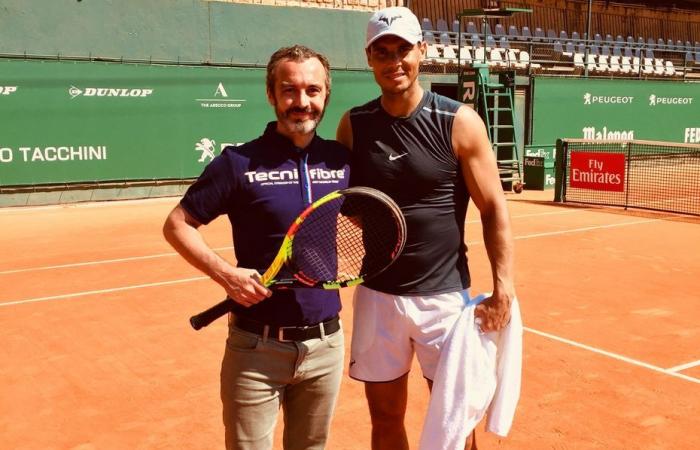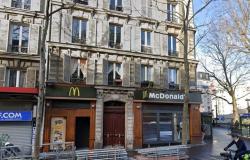
Maxime Boulanger was in Rafael Nadal’s team for almost fifteen years on the world Tennis circuit (ATP). He strung his rackets for three important tournaments of the season. A few days after the farewell of one of the legends of this sport, Picard returned to his journey, very closely linked, to the Spaniard.
The essentials of the day: our exclusive selection
Every day, our editorial team reserves the best regional news for you. A selection just for you, to stay in touch with your regions.
France Télévisions uses your email address to send you the newsletter “The essentials of the day: our exclusive selection”. You can unsubscribe at any time via the link at the bottom of this newsletter. Our privacy policy
For almost fifteen years, Maxime Boulanger, originally from Chauny, in Aisne, was the architect of several victories for Rafael Nadal, tennis legend. Picard strung the Spaniard’s rackets at three ATP circuit tournaments: The Masters 1000 in Monte-Carlo and Bercy, then the London Masters.
The collaboration with the Majorcan began during the Paris tournament in 2007. Two years after joining the circuit in 2005, the year of the Spaniard’s first coronation at Roland-Garros. He then officiated at the Grand Slam tournament, but with lower ranked players, due to lack of experience. “It was from 2007/2008 that I had the chance to string the big players“. He saw himself propelled with the king of clay.
Maxime Boulanger explains that “it was always important for Tony (the player’s uncle and coach) to have the same person” to string Rafael Nadal’s rackets.
•
© Maxime Boulanger
Each season, Rafael Nadal hired the services of six stringers. “There was trust, there was no problem, so there was no reason to change“, explains Maxime Boulanger.
This vocation, practiced by less than ten French people professionally on the most prestigious circuit, started with his brother. “He strung my racquets when I was younger on a manual machine. And, then, it was at my tennis club where I watched coaches string.“Subsequently, it was he who found himself behind the camera, in the sports stores of Saint-Quentin, before joining the capital.
Before shaping Rafael Nadal’s rackets, Maxime entered the world of the yellow ball, hitting it for the first time, at the age of five, at the Chauny club. Where he grew up. He then never left this universe again. “I was a ball boy at Roland-Garros in 1995 and 1996, but also at Bercy. I also had the chance to play with Nikolay Davydenko at Bercy (winner of the Masters 1000 in 2006), on the central court, as a sparring player. So, I’ve always been immersed in it.“
There was always hello, sympathy, recognition. Victory or defeat.
Maxime BoulangerProfessional stringer on the ATP circuit
When asked to delve into his memories with Rafael Nadal, Maxime recounts and relives them in detail. “There was this side (where) we are a team. It was always important for Tony (the player’s uncle and coach) to have the same person because there was superstition. It was always reassuring for the player and for the staff.“This is how he naturally expresses:”I won Monte-Carlo nine times with Nadal“, out of the eleven titles obtained by the Spaniard.
He remembers simple and respectful relationships. “It was someone who came, who put down his racket himself. There was always hello, sympathy, recognition. Victory or defeat, he still thanked the ropers, the staff.“
The memory that comes to mind most is “the express snowshoes”. Those who had to string in the middle of a match.
•
© Maxime Boulanger
The memory that comes to mind most is “the express snowshoes”. Those who had to string in the middle of a match. “In Monte-Carlo, we had a ritual. After eight games, he sent a racket express. And from that point on, I had the machine that was released. I was waiting for the racket to arrive, by the ball boys, to record it as quickly as possible, so that he could retrieve it.“Of the six or seven rackets he played with during the day, there was always”one or two rackets that he preferred“.
“Sometimes I brought her back on the court. Our eyes met.“ Without stopping, he moves from one anecdote to another, including that of the final of the Monte-Carlo tournament, pitting the Spaniard against the Frenchman, Gaël Monfils, in 2016. “I’m going to take the rackets back to the locker room. It’s just the two of us. We talk for two minutes, I encourage him. There’s always that wink, that smile and the thank you.“
In his story, he retraces a typical day in this first Masters 1000 on clay of the season. “In the morning, he came to train from 9 a.m. to 12 p.m. with three different sparring events. There, we had three or four rackets used because he hit so hard that he didn’t wait for the string to break.“He changed it as soon as the blood pressure dropped.”He finished training at noon. Afterwards, he went to the shower. He gave me two or three rackets to record for the match. When he returned to the center around 3/4 p.m., he played his match. So, we had six, seven rackets on the day. I calculated on a tournament, we had a little more than 40 rackets” over the week. All while stringing up other players at the same time.
Maxime specifies that “Rafa played with a gauge that was the thickest” of the circuit, that is to say, the thickest rope. “He put so much spin into his ball that he couldn’t play with a fine gauge“, like Roger Federer and Novak Djokovic. To understand better, the Spaniard played with a string 1.35 millimeters thick, compared to 1.25 millimeters for the other two legends.
A 20th Mont-Carlo in the viewfinder
Today, Picard keeps a lot of “good memories, especially when you see the route, the history. These remain special moments.“
Now, at 43, he works for the Tennis Club de Paris, “one of the most recognized clubs in France“, he emphasizes. This club has seen the greatest French players, such as certain “Mousketeers” of the last generation: Jo-Wilfried Tsonga and Gilles Simon. Or, Julien Beneteau, the current Fed Cup captain.
At the end of November, the ATP season is on pause. He is preparing for the next one. “I’m going back to Miami in March. And then, I’m going to do my 20th Monte-Carlo“. From Nadal to other emblematic players, Maxime has multiple anecdotes to share, enough to make many tennis fans, young and old, dream.





